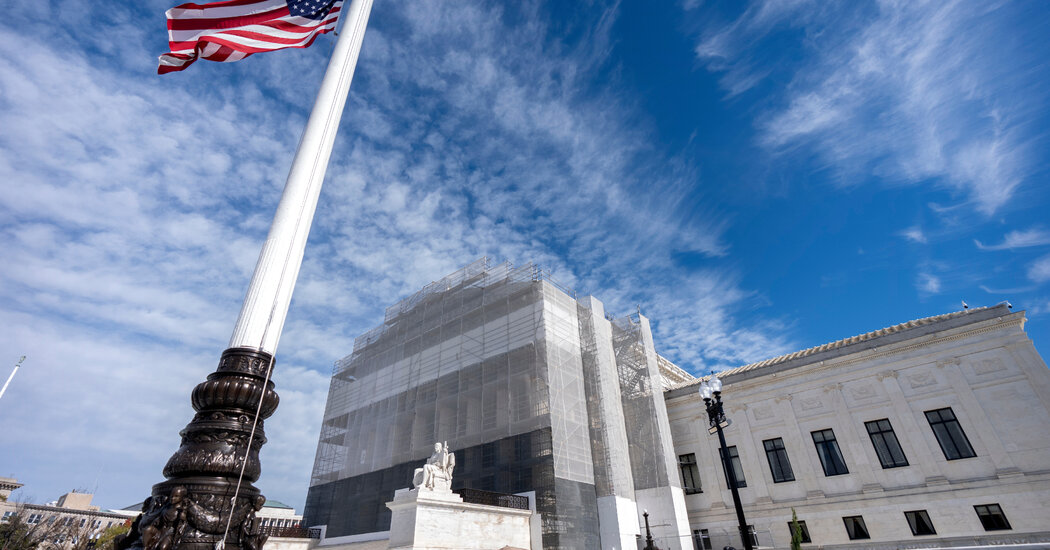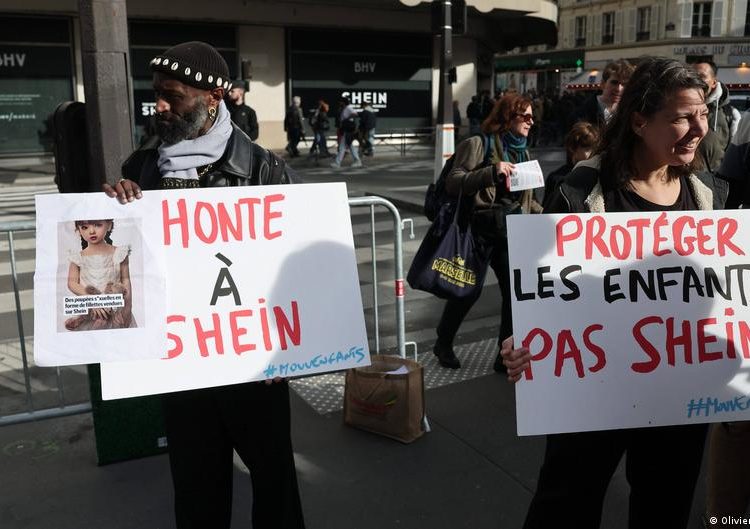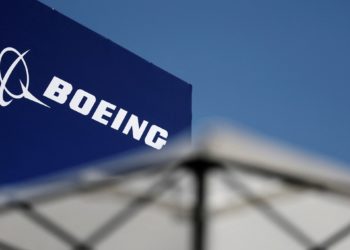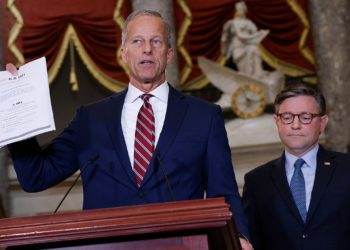Andrew here. The big headline to watch on Thursday is the result of Telsa’s shareholder vote on Elon Musk’s potentially $1 trillion pay package. At stake: If the package is voted down, Musk has threatened to step down as C.E.O. (Prediction markets suggest that the compensation plan will pass, with the odds implied by Kalshi bets standing at 91 percent.)
Also, corporate leaders in New York City are still assessing the implications of Zohran Mamdani’s mayoral victory. One big surprise: his appointment of Lina Khan, the former head of the F.T.C., to his transition team. For Wall Street deal makers, who thought that she was too aggressive at policing mergers, the move raised questions about how Mamdani plans to work with the business community.
A new wave of tariff jitters
President Trump’s barrage on global trade appears to have taken a hit. Investors are hardly rejoicing.
Concerns are growing that the Supreme Court could scramble the Trump administration’s tariffs strategy. That may be welcome news for free-trade advocates, but it could also unleash more uncertainty for businesses and Wall Street.
The latest: Markets in Europe, where Trump’s tariffs have rattled boardrooms and political capitals, fell on Thursday.
Those drops come after D. John Sauer, the solicitor general, faced tough questions from Supreme Court justices on the legality of the White House’s use of emergency powers to impose bruising tariffs. Lower courts ruled that the measures, justified under the International Emergency Economic Powers Act of 1977, were illegal.
The case is seen as test on the limits of executive power. Key conservative justices, including Amy Coney Barrett and Neil Gorsuch, joined the liberal members of the court in questioning the imposition of broad levies without congressional approval.
Chief Justice John Roberts Jr. likened the tariffs to “taxes on Americans,” which he said had “always been the core power of Congress.”
Markets reacted quickly to the proceedings. The yield on 10-year Treasury notes spiked to 4.15 percent. The sell-off suggests that bond holders are fretting that an adverse ruling could deprive the government of revenues needed to offset the federal deficit.
On the prediction market Kalshi, the odds of a favorable ruling on the IEEPA tariffs plunged to 28 percent, down from 58 percent in early September.
The administration has other ways to impose tariffs. Even if the IEEPA levies are found illegal, the government could introduce more under other trade laws. “If the Supreme Court rules against the administration, I don’t think it’s the end of the road for tariff policy,” Mitchell Goldberg, the head of ClientFirst Strategy, a financial advisory firm, told CNBC. “It’s just another bump in the road.”
But a setback could add uncertainty to business and trade. Would companies try to claw back reimbursement for duties paid on the affected tariffs? What would that do to the Treasury Department’s financial projections?
And what about continuing negotiations with big trading partners like India and Brazil? Will these countries recalibrate their demands if they sense that the Supreme Court may rule that a big piece of Trump’s tariff strategy is illegal?
HERE’S WHAT’S HAPPENING
A pivotal vote on Elon Musk’s pay package is set for Thursday. Tesla will announce whether enough of its shareholders approved a compensation scheme for its C.E.O. that could be worth nearly $1 trillion if certain milestones are met. Some experts have questioned whether such pay-for-performance packages actually work, but Musk (whose previous Tesla compensation plan was struck down in Delaware) has threatened to leave if this one is rejected.
France blocks Shein over sex dolls. The country’s crackdown on the low-cost online retailer came after the discovery of sex dolls “resembling children” for sale on its platform. (Shein said it was “committed to working with the French authorities.”) Anger in France over the retailer has grown as it opened its first physical store, in Paris, with detractors citing the company’s environmental record and use of cheap labor.
Wall Street heavyweights participate in a huge fund-raiser for Ripple. The crypto company raised $500 million, with investors including Fortress Investment Group and Ken Griffin’s Citadel Securities, giving it a $40 billion valuation. It’s the latest sign of crypto’s ascendancy in the second Trump administration.
The toll of the shutdown
An escalation in the government shutdown drama could hit major airports. Travelers are bracing for big delays and canceled flights as the standoff enters a 37th day — with lawmakers still at an impasse.
Here’s the latest:
Travel travails: The Trump administration said it would gradually cut air traffic at 40 of the nation’s busiest airports starting tomorrow, a move that analysts say would force thousands of flight cancellations. Transportation Secretary Sean Duffy said on Wednesday that the move was necessary to “alleviate the pressure” on air traffic controllers who have been working without pay during the shutdown.
Major airports affected are expected to include those in Atlanta, Los Angeles, Newark, New York and the Washington, D.C. area, according to ABC News. Shares in major carriers, including United Airlines, fell in premarket trading. Duffy had warned earlier this week of the potential for “mass chaos” in the national airspace by next week if the shutdown continues.
The shutdown is the longest in U.S. history and the most expensive. The Congressional Budget Office estimates that if the shutdown reaches the six-week mark (which would be next week), it would cost $11 billion in lost G.D.P. that would not be recovered.
The political costs are growing too. President Trump wrote on social media that the shutdown was probably a factor in the Democrats’ strong results on Election Day.
He warned Republican senators on Wednesday that they would face voters’ wrath in the midterms if they didn’t end the shutdown, according to Axios. Trump’s solution: end the filibuster, which requires 60 votes in the Senate to pass most legislation, essentially lowering the bar to reopen the government. But Senator John Thune, the majority leader, said that “there just simply aren’t the votes to get rid of” the filibuster.
Election Day may complicate negotiations, too. Emboldened by a string of poll victories on Tuesday, Democratic leaders now appear set to hold firm on their big ask: an extension of Obamacare subsidies.
Mamdani turns up the heat
Fresh off his decisive victory, Zohran Mamdani, New York’s mayor-elect, has started laying the groundwork for his administration.
Yet for many in the city’s elite who have hoped to build bridges with a candidate who ran unabashedly to the left, his first moves gave more reasons to be concerned.
A familiar face was named as a chair of Mamdani’s transition team: Lina Khan, the former F.T.C. commissioner who faced corporate America’s ire over her tough approach to antitrust enforcement.
At a news conference on Wednesday, Khan sounded many of the same notes that made her an antagonist to business leaders across the political spectrum. “I think what we saw last night was New Yorkers not just electing a new mayor, but clearly rejecting a politics where outsize corporate power and money too often end up dictating our politics, and a clear mandate for change,” she said.
Mamdani has shed his recently adopted conciliatory tone, citing a mandate to deliver on the progressive agenda that propelled him to victory. He told The Times that his call to tax the wealthy — which he played down in the closing days of his campaign — was as much about fairness as it was about raising revenue.
“My supporters and our movement are hungry for a politics of consistency,” he told The Times. “I think that our tax system is an example of the many ways in which working people have been betrayed,” he added.
Yet Mamdani also emphasized his desire to meet with the business community. At a news conference on Wednesday he singled out Jamie Dimon of JPMorgan Chase, one of the city’s biggest employers, as someone he wanted to “show that our affordability agenda is an agenda that would also benefit business across the city.”
Some business leaders projected a willingness to meet and listen. Dimon told CNN that he had put in a call to the mayor-elect, and questioned moves by other companies out of New York.
Still, the JPMorgan chief suggested that he was concerned about Mamdani’s inexperience — given how difficult the city is to govern — and said that New York would ultimately have to compete to keep businesses from fleeing. “No city has divine rights to success,” Dimon said.
And while Bill Ackman, the billionaire financier who spent millions trying to defeat Mamdani’s campaign, defended his extending an olive branch to the mayor-elect, he also reposted another user’s dire predictions for New York during the Mamdani administration, calling it “an accurate prognosis for NYC.”
Will Beijing win the A.I. race?
Artificial intelligence dominance is one of the newest battlegrounds between the U.S. and China, prompting a slew of geopolitical policies across the Biden and Trump administrations.
But a new provocation by Jensen Huang of Nvidia, the pre-eminent A.I. chipmaker, and comments by a top OpenAI executive (that were quickly played down) suggest that government policy, not technological prowess, may be the key to winning the fight.
“China is going to win the A.I. race,” Huang told The Financial Times on Wednesday, citing Beijing’s vast support of its homegrown industry. Some of his reasons: huge government subsidies for energy producers to support data centers — “power is free,” Huang said — and looser regulations on A.I. products.
A huge caveat: The Nvidia chief’s comments come shortly after President Trump — who has otherwise championed the American A.I. industry — said he wouldn’t let the chipmaker export its highly advanced Blackwell processors to China. Speaking about Beijing, Trump said, “We will let them deal with Nvidia but not in terms of the most advanced” chips.
China hawks in Washington have consistently warned against letting Chinese companies get access to the best Nvidia processors, arguing that doing so would undercut America’s A.I. position. But Nvidia and Huang have lobbied intensely for a loosening of such restrictions, and thought they had scored a breakthrough with Trump this summer.
Huang isn’t alone in singling out government policy around A.I. At a Wall Street Journal conference on Wednesday, Sarah Friar, OpenAI’s C.F.O., said that federal support for the financing required to buy A.I. processors would be really helpful. “This is where we’re looking for an ecosystem of banks, private equity, maybe even governmental, the ways governments can come to bear,” she said.
The deeply unprofitable OpenAI has outlined an astonishing $1.4 trillion in financing commitments for A.I. infrastructure. That level of proposed spending is increasingly worrying investors.
Friar later walked back her comment, writing on LinkedIn that her word choice “muddied the point.” She added, “American strength in technology will come from building real industrial capacity which requires the private sector and government playing their part.”
THE SPEED READ
Deals
-
Sequoia named Alfred Lin and Pat Grady, two of its most successful partners, as its new leaders, succeeding Roelof Botha. (TechCrunch)
-
Pfizer lost a legal bid to temporarily block Novo Nordisk’s bid for the obesity drug maker Metsera, though F.T.C. officials questioned whether Novo Nordisk’s effort may have violated antitrust law. (Bloomberg)
Technology and artificial intelligence
-
Nexperia, a maker of chips for carmakers at the center of a clash between Amsterdam and Beijing, warned that the quality of some products made in China after Oct. 13 couldn’t be guaranteed. (Reuters)
-
Apple is reportedly near a deal to pay Google roughly $1 billion a year to use a version of the Gemini chatbot to upgrade its Siri digital assistant. (Bloomberg)
Best of the rest
-
Shares in Pinterest tumbled 21 percent on Wednesday after the social media company reported disappointing quarterly results partly because of a hit from tariffs. (CNBC)
-
“They Fell in Love With A.I. Chatbots — and Found Something Real” (NYT)
We’d like your feedback! Please email thoughts and suggestions to [email protected].
Andrew Ross Sorkin is a columnist and the founder of DealBook, the flagship business and policy newsletter at The Times and an annual conference.
Bernhard Warner is a senior editor for DealBook, a newsletter from The Times, covering business trends, the economy and the markets.
Sarah Kessler is the weekend edition editor of the DealBook newsletter and writes features on business.
Michael J. de la Merced has covered global business and finance news for The Times since 2006.
Niko Gallogly is a Times reporter, covering business for the DealBook newsletter.
The post What a Rough Day in Court Means for Trump’s Tariffs appeared first on New York Times.




